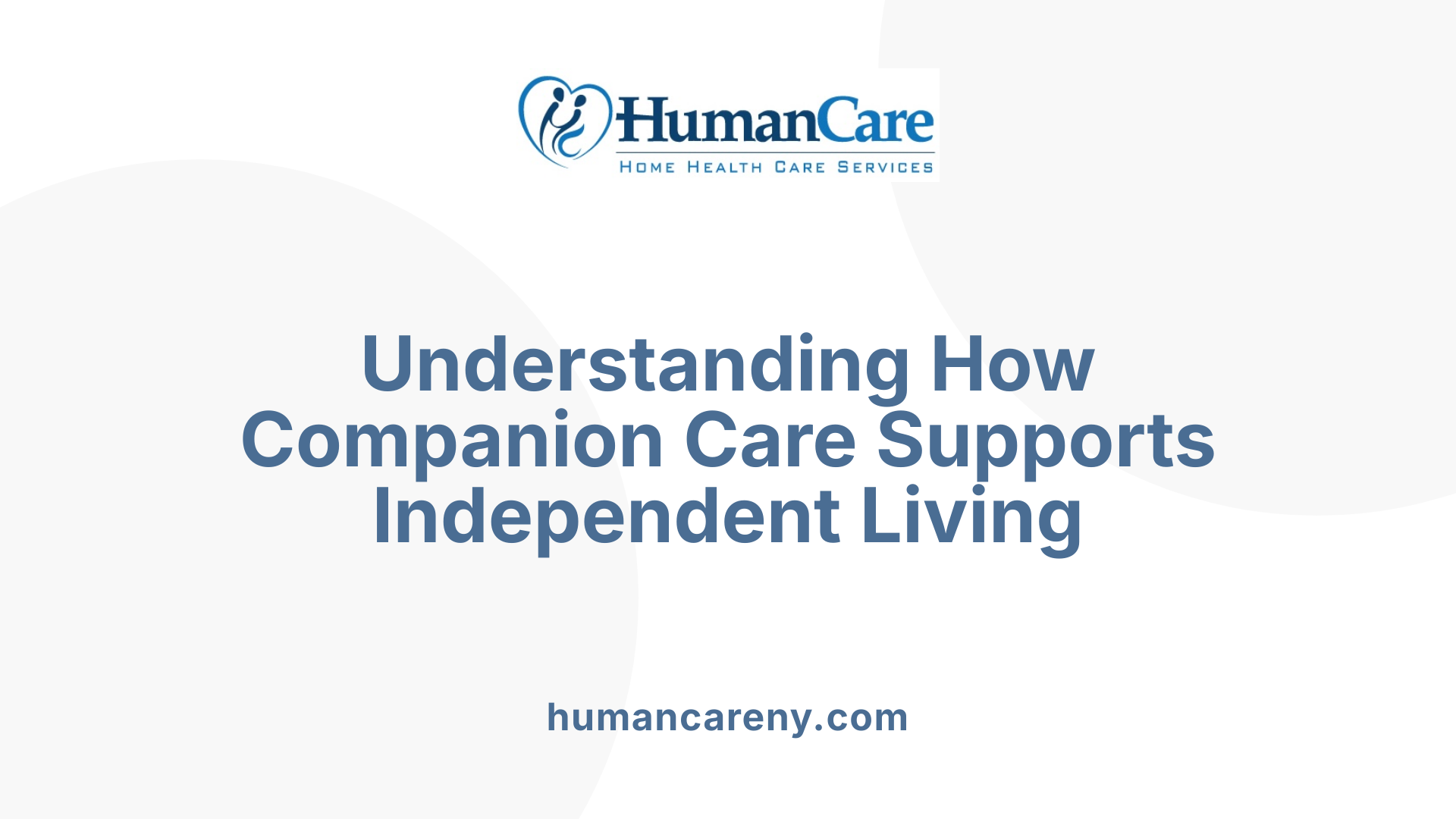Understanding How Compassionate Support Can Keep Seniors Safe and Healthy
As the aging population grows, reducing senior hospitalizations has become a vital goal for healthcare providers, families, and caregivers. Companion care emerges as a pivotal strategy to promote health, safety, and emotional well-being among seniors. This article explores how personalized companionship, social engagement, safety monitoring, and tailored home assistance can significantly decrease the need for emergency hospital stays, thus fostering healthier aging and enhancing quality of life.
How does companion care work?
 Companion care provides essential support to seniors by focusing on social, emotional, and daily activity assistance within their homes. This service is designed to help older adults stay independent, safe, and connected.
Companion care provides essential support to seniors by focusing on social, emotional, and daily activity assistance within their homes. This service is designed to help older adults stay independent, safe, and connected.
Types of services offered include companionship for conversation and social engagement, help with household chores such as cleaning and laundry, meal preparation, transportation to appointments, medication reminders, and personal care tasks like bathing and dressing. Additionally, companions often facilitate participation in community activities, which helps seniors maintain a sense of purpose.
Personalized care plans are fundamental to companion care. Care providers work closely with seniors and their families to tailor services according to individual preferences and needs. This flexibility ensures that seniors receive the appropriate level of support, whether for occasional visits or daily assistance.
Role of caregivers in daily support involves more than just completing chores. They act as emotional anchors, providing companionship that can significantly improve mental health and reduce feelings of loneliness. Caregivers also observe safety hazards in the home, assist in emergencies, and encourage light physical activities to promote mobility and prevent falls. This broad support helps seniors lead happier, healthier lives, maintaining their independence and emotional well-being.
| Service Type | Support Examples | Additional Benefits |
|---|---|---|
| Social and emotional support | Conversations, outings, emotional encouragement | Reduces loneliness, depression, and cognitive decline |
| Daily activity assistance | Bathing, dressing, medication reminders | Ensures safety, promotes independence |
| Household chores | Cleaning, cooking, laundry | Maintains a clean and safe environment |
| Transportation | Doctor visits, shopping, errands | Keeps seniors engaged and connected to their community |
Overall, companion care is a comprehensive in-home service that promotes elder well-being, safety, and social connection, significantly improving seniors' quality of life.
The importance of emotional support and social engagement in reducing hospitalizations

Why is companionship important in caregiving?
Companionship plays a crucial role in caregiving because it offers more than just presence. It provides emotional support, understanding, and social connection, which are vital for mental and emotional well-being. By preventing feelings of loneliness, companionship helps lower the risk of depression, cognitive decline, and physical health issues like cardiovascular disease.
Trusted companions help individuals regain confidence after illness or bereavement, fostering a sense of stability and routine. This familiarity can ease anxiety and agitation, especially for seniors with dementia. Additionally, companions encourage social engagement and participation in community activities, which enrich daily life and promote independence.
Overall, companionship enhances the safety and quality of care, contributing to a more fulfilling and healthier life for seniors.
How does social interaction influence senior health and longevity?
Extensive research involving over 458,000 participants over 12.6 years highlights the importance of regular social contact for seniors. This study found a strong link between social interactions—such as visits from friends or family—and a decreased risk of death. Seniors without such engagement face a 39% higher chance of mortality, emphasizing how social isolation negatively impacts both physical and mental health.
Consistent social engagement helps reduce feelings of loneliness, depression, and cognitive decline. It maintains mental health, stimulates cognitive functions, and encourages a purposeful lifestyle. These benefits contribute to lower hospitalization rates and support healthy aging by fostering a sense of belonging and activity.
| Aspect | Impact | Additional Notes |
|---|---|---|
| Social interaction | Reduced mortality risk | 12.6-year longitudinal data |
| Feelings of loneliness | Increased health risks | Linked to depression and cognitive problems |
| Mental engagement | Cognitive health | Supports memory and decision-making |
| Physical activity | Improved mobility | Encouraged through companionship |
Providing regular, personalized social interaction has measurable benefits that can extend life expectancy and improve the quality of life for seniors.
How companion care helps prevent hospitalizations and manage health risks

How can companion care help reduce hospitalizations among seniors?
Companion care plays a vital role in lowering hospitalization rates for seniors by offering consistent social interaction and practical support that promote overall health. Caregivers provide assistance with daily routines, medication reminders, and safety monitoring to identify emerging health issues early. Their presence encourages seniors to stay engaged physically and mentally, reducing risks associated with loneliness, depression, and cognitive decline.
Furthermore, companion caregivers help prevent accidents such as falls by encouraging light physical activity, ensuring a hazard-free environment, and monitoring mobility. They can also quickly respond to health changes or emergencies, helping manage chronic conditions and ensuring timely medical attention. This proactive approach preserves seniors’ independence and quality of life, ultimately reducing the need for emergency room visits and hospital stays.
What strategies do home care services use to prevent hospital readmissions?
Home care services employ multiple strategies aimed at keeping seniors healthy and at home after hospital visits. One major approach involves maintaining open communication channels between caregivers and healthcare providers. Sharing detailed health records, discharge instructions, and treatment plans enables caregivers to monitor progress accurately.
Regular follow-up through phone calls, health assessments, and remote monitoring devices helps detect early warning signs of deterioration. Supporting patients in adhering to medication schedules and lifestyle modifications improves recovery and prevents complications.
Addressing social factors is also vital. Caregivers often coordinate with family members and community resources to support emotional well-being and ensure compliance with care routines. Educational support that clearly explains medical instructions minimizes misunderstandings, aiding recovery.
Technology tools, such as remote patient monitoring, gather real-time data on vital signs and symptoms. This technology allows for swift intervention if concerning patterns emerge, reducing the likelihood of readmission.
| Strategy | Description | Benefits |
|---|---|---|
| Improved communication | Sharing detailed health info with hospital | Ensures continuity of care |
| Regular follow-ups | Calls, assessments, remote monitoring | Detects issues early |
| Social support enhancement | Involving family/community | Promotes adherence and emotional well-being |
| Technology use | Wearables, remote monitoring | Early problem detection |
By integrating these methods, home care services provide a comprehensive safety net that supports recovery and helps seniors maintain their independence while reducing hospital readmission risks.
The role of home and hospital support in reducing hospital stays

How can companion care support seniors during hospital stays?
Having a companion for elderly patients in the hospital can significantly ease their emotional and physical challenges. These companions help reduce feelings of loneliness, anxiety, and depression, which are common in hospital settings. They can assist with daily needs such as eating and attending to bathroom requirements, tasks that may be overlooked during busy medical routines.
Companions also help improve patients' overall comfort and emotional well-being by fostering meaningful connections. They facilitate better communication with healthcare providers by understanding the patient’s symptoms and sharing vital information, leading to improved care. Their presence can help identify and address safety hazards or health concerns early, reducing risks like falls or worsening conditions.
What steps can be taken post-hospitalization to prevent readmission?
After returning home, continuous support through companion care remains vital. Caregivers can monitor the patient’s health, ensure medication adherence, and provide emotional encouragement. This ongoing assistance helps address potential issues before they escalate, supporting smooth recovery.
Engaging seniors in mental activities, managing daily routines, and maintaining a safe, supportive environment help prevent complications and the need for further hospitalizations. Regular social interaction also promotes emotional well-being, which is linked to overall health. Personalized, consistent care ensures that recovery progress is maintained, reducing the risk of readmission.
Promoting a Safer and Healthier Aging Experience
Companion care is a powerful, adaptable approach that addresses the multifaceted needs of seniors, emphasizing safety, social engagement, emotional support, and preventative health measures. By supporting medication adherence, safety monitoring, mental stimulation, and social involvement, companion care significantly contributes to reducing hospitalizations. The integration of these services into senior care plans not only improves health outcomes but also enhances quality of life, allowing elderly individuals to enjoy independence and dignity longer. As healthcare systems evolve, investing in companion care will remain a cornerstone of strategies aimed at fostering healthier, more connected aging populations.
References
- How Companion Care Enhances Quality of Life for Seniors | SBB
- Understanding Senior Companion Care
- The Vital Role of Elderly Companion Care in Enhancing Quality of Life
- The Importance of Companionship During a Hospital Stay
- The Vital Impact of Companion Care for the Elderly
- In Hospital Companion Care - Neighborly Home Care
- What Is Companion Care For The Elderly? - AmeriBest Home Care
- Home Care Services | Home Care For Elder
- AmeriBest Home Care
- Why Companion Care in Philadelphia is Essential for Seniors Living ...



